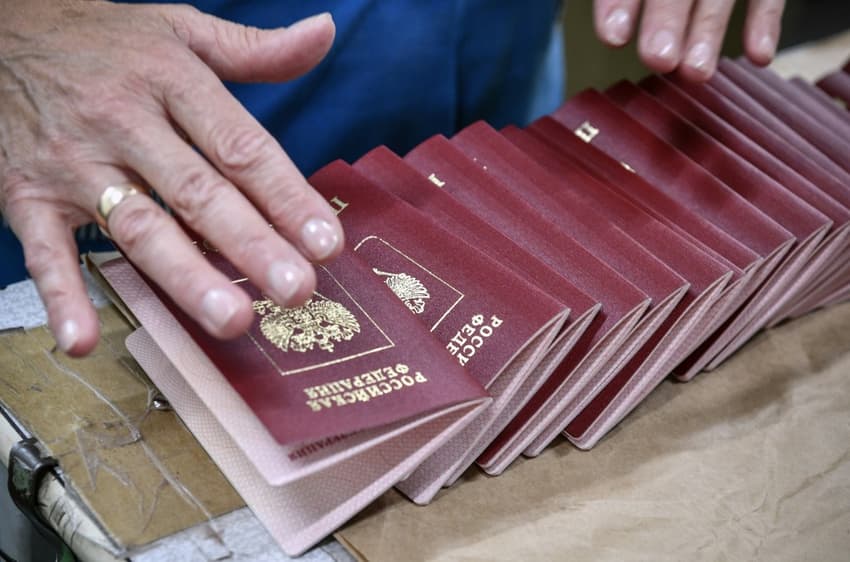How wealthy foreigners can 'buy' a Swiss residence permit

Rich people from non-EU/EFTA countries can receive a residence “B” permit, allowing them to live in Switzerland. But it comes at a steep price.
Usually, a B residence permit is given to EU / EFTA nationals who are employed in Switzerland for at least 12 months.
But Swiss cantons can also grant these permits to non-European foreigners if they can prove that they have sufficient financial means and adequate health and accident insurance to live in Switzerland without having to resort to welfare benefits.
According to a survey carried out by RTS public broadcaster, wealthy foreigners can negotiate an annual tax package that varies greatly from canton to canton.
Most of beneficiaries of this scheme are rich Russians, followed by Turks, Chinese, Ukrainians, and citizens of Gulf countries.
READ MORE: EXPLAINED: What's the difference between permanent residence and Swiss citizenship?
RTS noted that the number of requests for the permit has increased since the start of the coronavirus pandemic, as well-heeled people want to move away from developing nations to safer and more prosperous locatons.
"Switzerland is the Rolls-Royce of destinations. These rich foreigners want a country that has good health infrastructure", said Enzo Caputo, a Zurich lawyer specialising in permits and tax packages.
Another advantage of a B-permit is that it allows third-nation citizens to move freely throughout the Schengen area.
‘Golden visas’: How multi-millionaires are ‘buying’ Swiss residency permits
So how much in tax revenue do foreigners have to shell out for the B-pemit?
It depends on where in Switzerland they would like to live.
According to RTS, which surveyed only French-speaking cantons, Jura has the lowest minimum tax rate for a non-EU foreigner — 146,816 francs in taxes annually. Next is Neuchâtel (190,000), Fribourg (209,000), Valais (287,882), Geneva (312,522), and Vaud (415,000 ).
Geneva is the canton that has issued the most B permits to wealthy non-Europeans (58), followed by Vaud (24), and Valais (16).
At the end of 2018, the last year for which statistics are available, 4,557 people were taxed at a fixed rate, paying an annual tax of 821 million francs.
For more information on 'golden visas', click the following link.
KEY POINTS: What you need to know about golden visas in Switzerland
Comments (2)
See Also
Usually, a B residence permit is given to EU / EFTA nationals who are employed in Switzerland for at least 12 months.
But Swiss cantons can also grant these permits to non-European foreigners if they can prove that they have sufficient financial means and adequate health and accident insurance to live in Switzerland without having to resort to welfare benefits.
According to a survey carried out by RTS public broadcaster, wealthy foreigners can negotiate an annual tax package that varies greatly from canton to canton.
Most of beneficiaries of this scheme are rich Russians, followed by Turks, Chinese, Ukrainians, and citizens of Gulf countries.
READ MORE: EXPLAINED: What's the difference between permanent residence and Swiss citizenship?
RTS noted that the number of requests for the permit has increased since the start of the coronavirus pandemic, as well-heeled people want to move away from developing nations to safer and more prosperous locatons.
"Switzerland is the Rolls-Royce of destinations. These rich foreigners want a country that has good health infrastructure", said Enzo Caputo, a Zurich lawyer specialising in permits and tax packages.
Another advantage of a B-permit is that it allows third-nation citizens to move freely throughout the Schengen area.
‘Golden visas’: How multi-millionaires are ‘buying’ Swiss residency permits
So how much in tax revenue do foreigners have to shell out for the B-pemit?
It depends on where in Switzerland they would like to live.
According to RTS, which surveyed only French-speaking cantons, Jura has the lowest minimum tax rate for a non-EU foreigner — 146,816 francs in taxes annually. Next is Neuchâtel (190,000), Fribourg (209,000), Valais (287,882), Geneva (312,522), and Vaud (415,000 ).
Geneva is the canton that has issued the most B permits to wealthy non-Europeans (58), followed by Vaud (24), and Valais (16).
At the end of 2018, the last year for which statistics are available, 4,557 people were taxed at a fixed rate, paying an annual tax of 821 million francs.
For more information on 'golden visas', click the following link.
KEY POINTS: What you need to know about golden visas in Switzerland
Join the conversation in our comments section below. Share your own views and experience and if you have a question or suggestion for our journalists then email us at [email protected].
Please keep comments civil, constructive and on topic – and make sure to read our terms of use before getting involved.
Please log in here to leave a comment.